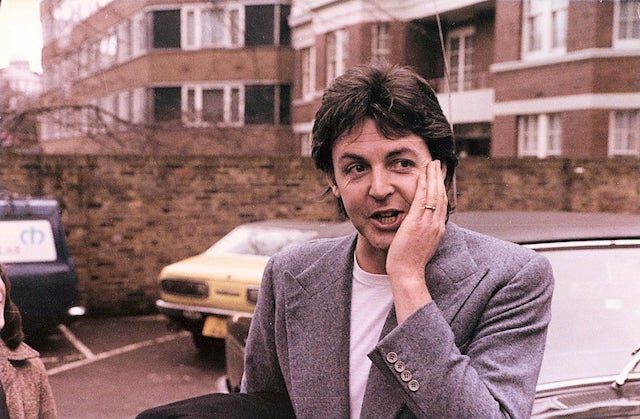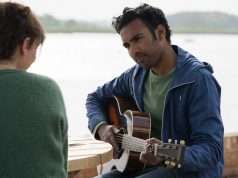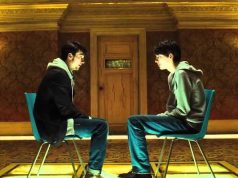
Paul McCartney was an extraordinarily wealthy man, one of the most successful songwriters in history and a charter member of rock ‘n’ roll’s greatest, most influential band (Wings). Yet this was not enough. Having caught a bit of the “acting bug” when the Beatles made their movies, Paul longed to return to the thespian arts, to once again bring a character to life through the magic of acting! He finally got his chance in 1984, with the movie “Give My Regards to Broad Street,” in which he plays himself and mostly just sings a lot. Acting!
McCartney wrote the screenplay, too, which sounds like a bad idea until you realize it’s just “[and then I sing a song],” repeated for 100 pages. I’m only barely exaggerating. The movie is 108 minutes long, including credits. Of those 108 minutes, 53 — I KEPT TRACK — consist of music, usually with the dullest possible visual accompaniment: Paul and his band rehearsing, Paul and his band in a recording studio, Paul and his band rehearsing again but somewhere else, Paul and his band in a different recording studio, etc. Sometimes the movie will switch things up and just put a McCartney song on the soundtrack while we see a montage of Paul driving, presumably as a respite from the adrenaline-pumping excitement of seeing him sit on a stool with a guitar.
Now, I enjoy seeing Paul McCartney play instruments and sing songs as much as the next person (unless the next person is my mom), but devoting half a feature film to it seems liable to tax the attention span of even the most ardent McCartneyite. It’s not like we’re at a concert and he’s live on stage. We’re watching a movie, and that movie has filmed images of him lip-synching songs that he recorded prior to filming. Not exactly dazzling stuff, cinematically speaking. Convenience store surveillance tapes have more action, not to mention fewer Ringo cameos.
The question isn’t how a movie like this got made. It got made because Paul McCartney wanted it to get made, and nobody says no to Paul McCartney. He will cut you. If Paul McCartney comes to you and says, “I want to spend part of my untold riches on a vanity project that no one except me will enjoy,” YOU LET HIM. The last person who said no to him ended up with a leg missing.
No, the question is not why this movie exists but why it has not become a cult favorite, like most musicians’ unwatchable vanity projects. No matter how bad a movie is, there’s usually some group of devoted fans who will claim to love it, usually the same people who also just happen to love every single other thing that artist has ever done. But not “Give My Regards to Broad Street”! Ain’t nobody sticking up for this. I bet if you asked Paul McCartney himself what he thinks of it, you wouldn’t be able to hear the reply because he lives in a giant bubble made of money, and because his bodyguards would snap your neck.
The plot that happens between musical numbers is as follows. The person who was supposed to deliver the master tapes of Paul’s new album to the record factory has disappeared. The fellow’s name is Harry. He had a prison record before Paul hired him, but Paul trusted that he’d gone straight. Everyone else was skeptical, and now they take turns telling Paul he was wrong to trust an ex-con, who has surely stolen the tapes. No, no, says Paul. He must have been hurt or abducted or something. Paul still believes Harry is good. And if I’ve learned anything from vanity projects written by stars in which they play idealized versions of themselves, it’s that Paul is going to turn out to be right and everybody else wrong.
So that’s the movie: looking for Harry. Well, the tapes. No one gives two farts about Harry. If the tapes don’t turn up by midnight, a flock of crusty old investors will claim ownership of Paul’s company, or possibly of Paul himself, it isn’t clear. The point is, it’s fun for movies to have deadlines, so this one has a deadline of midnight. Wheee!
In between periods of looking for Harry, Paul goes about his busy day of rehearsals and such, as mentioned, in what feels like real time. Sometimes he gets distracted while singing and has daydreams of Harry being chased by the police — but no, Paul is sure Harry is not a criminal. After each song he’ll ask someone on his staff if there’s been any word from Harry, and the answer is always no, and Paul always replies optimistically that “things will work out.” Then he goes somewhere else and does another song. THAT’S THE WHOLE MOVIE.
Ringo Starr plays Paul’s drummer, and does about as good a job of it as he did in the Beatles. There’s a scene where a lady reporter asks if she can interview him, and Ringo falls in love with her. This occupies maybe 90 seconds of screen time and is never mentioned again, because this is Paul’s movie, dammit, not Ringo’s. You want a subplot? Go make your own movie. But you definitely get the vibe that the lady reporter was Ringo’s real-life wife or girlfriend — which she was — and that she’s in the movie because Ringo was like, “Oi, guv’na, could we put me bird in the movie?,” and Paul was like, “Yeah, sure, whatever.”
IMPORTANT NOTICE: Tracey Ullman is in this movie. She plays Harry’s mistress. She doesn’t know where Harry is, either. That is all.
This is all tedious and frustrating, but so far the film has not been exasperating. Boring, sure, but not flagrantly annoying. This changes with the dramatic conclusion, when Paul remembers seeing Harry with the tapes last night, and Harry saying, “Good night, all! I’m off to Broad Street!” Of course! He was going to the Broad Street rail station to take a train home to whatever comically named London neighborhood he lives in — Chichester, or Houndsbane, or Dicksworth, or Hammertyme, or Spoon-on-Tinkle, or whatever! It doesn’t take a detective to conclude that since Broad Street is the last place anyone knew Harry was going, it would be prudent to look for clues there. It does, however, take some kind of special brainiac not to remember this until 10 minutes to midnight.
Sure enough, there are the master tapes sitting on a bench at the Broad Street station, untouched by any of the thousands of passengers who passed by over the course of the day. But where is Harry? Oh, Harry’s stuck in a maintenance shed, obviously. He stumbled in there while waiting for the train, thinking it was a public restroom, and got locked in. (He left the tapes on the bench when he went looking for the toilet, as you would expect from a valued employee entrusted with such an important piece of property.) Harry was in the shed overnight and throughout all of today, unable to get anyone’s attention to let him out until now, when Paul hears him. (Maybe Paul is the only person who can hear Harry?) Paul, good-hearted soul that he is, has a laugh with Harry about the crazy misunderstanding. He does not do what you or I would do, which is push Harry in front of a train.
And thus the repetitive, uninteresting mystery that occupied the parts of the movie that weren’t occupied by repetitive, uninteresting songs comes to a close! We sat through all of this for THAT.
Oh, but wait! Then the movie reveals that none of this happened, and that it was all a daydream Paul had in the back of the limo on the way to doing publicity for the new album. Ha ha, says the movie! Gotcha! You just watched 108 minutes of Paul McCartney daydreaming! This answers the age-old question about whether celebrities have more entertaining fantasies than regular people do, and the answer is no, their fantasies are boring and have too many songs in them.
— Film.com





